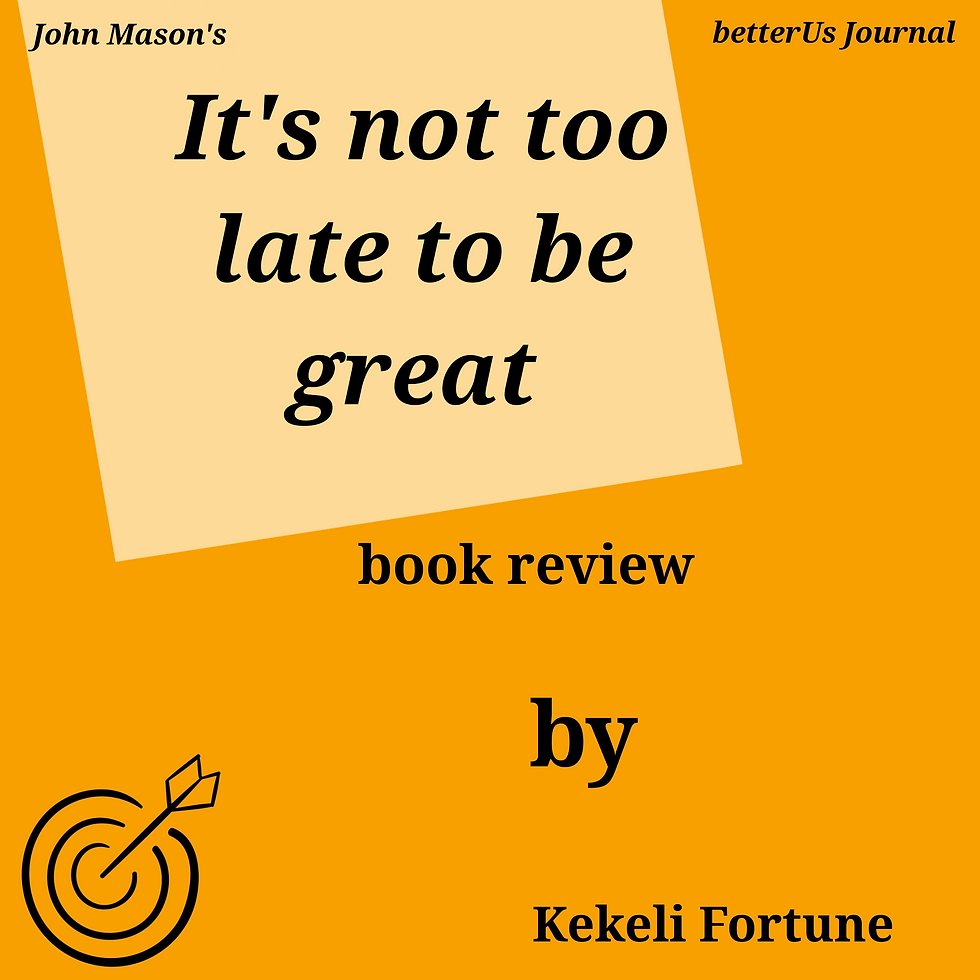A book review of Malcolm Gladwell’s outliers
- Kekeli Fortune

- May 6, 2020
- 4 min read
Updated: May 7, 2020

Thank you for joining me for my second book review. I really hope everyone is being safe.
In this week’s post, we are reviewing the book outliers, by Malcolm Gladwell. I must tell you this, it’s quite a long discussion, so make sure to get comfy! But please indulge me because this discussion is guaranteed to enlighten and encourage you.
In writing Outliers, Malcolm Gladwell’s goal was to provide a whole different understanding of success. It was to prove that no one is ever actually “self-made” and no one rises to success from nothing. He stated in the introductory chapter that “The people who stand before kings may look like they did it all by themselves, but in fact, they are invariably the beneficiaries of hidden advantages, and extraordinary opportunities, and cultural legacies that allow them to learn, and work hard and make sense of the world in ways others cannot.”
What this means in essence is that successful people are a product of the times in which they were born, the cultures of their societies and families which they became accustomed to, the localities and the environment in which they were raised and finally, the resources they were exposed to. Of course, it is a matter of choice; individuals decide what to make of the circumstances that they have been dealt with, but we must also admit that some have it easier than others and this makes a huge impact on who consequently makes it.
To prove his point, he made this analogy, “the tallest oak in the forest is the tallest not just because it grew from the hardiest acorn; it is the tallest also because no other trees blocked its sunlight, the soil around it was deep and rich, no rabbit chewed through its bark as a sapling, and no lumber jack cut it down before it matured.”
So, who you are and what you are made of as an individual counts, but its also a matter of what you have or what you were given and what you made of it (read this again; more carefully this time). This understanding of success proposed by Malcolm Gladwell puts the popular African adage “all the fingers are not same” in so much perspective.
In business for example, success is usually attained by people who are innovative and creative enough with the resources they have been given to meet the rising needs of a population. It is also attained by people who prepared for the right opportunities which they were able to recognize and take hold of. But this is not the reason why certain companies such as amazon, zoom, and Moderna Inc have made over 100% profits in the shortest time possible during this pandemic whiles others such as companies in the hospitality industry are under a lot pressure. These profiting companies are not prospering solely due to leadership, but also because the services they provide are essential during these times. No one knew this COVID-19 pandemic was going to happen therefore, this isn’t a matter of preparation only, it is also a matter of the environment.
The famous 10, 000 hours rule.
Apart from the environment, success also depends on talent, passion and hard work. Lets now take a look at the extent of impact of each of these when it comes to success.
Achievement is as a result of talent and preparation. After a closer look at the successful, achievement is mostly based on preparation; talent plays such a small role. Psychologist, K. Anders Ericsson studied 3 groups of violinists: the elite, the good, and the average—those who will grow up to become music teachers in public schools. The purpose of this study was to determine what accounted for the different classes. What he found out was that students in the elite class put in 10,000 hours of practice by the time they were 20 years, those in the good class put in 8, 000 hours and lastly, those in the average class put in just 4,000 hours of practice.
There were no naturally talented elites who didn’t practice for at least 10, 000 hours by the age of 20 years, but still made it into that class for some other reason— maybe how rich their parents were, or how talented they were; At the end of the day, if you didn’t put in the hours, you didn’t make it! Its not surprising that they also didn’t find anyone without the natural talent who failed to reach the highest ranks in music despite working very hard—harder than their peers. So, the key here isn’t talent; you must work extra, extra hard, if you want to be distinguished from your peers.
Malcolm isn’t saying that to learn a new skill, you’d have to put in at least 10, 000 hours of practice, but rather, he is making the contribution that to be an expert in your field and to be internationally recognized, the 10, 000 hours of practice is required.
People like Bill Joy—who co-founded Sun Microsystem, rewrote the code UNIX and also known for JAVA—and the famous Bill Gate both mentioned that they had been practicing for at 10, 000 hours before they were assigned any significant roles, or before they had to start their companies. Even prodigies such as Mozart only started producing his masterworks after he turned 21 years; by then, he had 10 years of practice.
So, what are we to take home from all this?
If you find your self in an environment not conducive for success, strive to get out; use all resources available, and improvise as much as possible. Also identify gaps in your skill set and be studious towards self-development. And finally, whatever you are passionate about, or whatever tool you want to change the world with, you must keep sharpening. As it is popularly said, “practice makes perfect”. This book outliers is the kind that sets that fire in your belly and gives you so much perspective. It contains so many stories about people like Bill Gates and Bill Joy, and of groups of people like the Jews on how they used their environment —even the challenging—, and resources they had to succeed. I encourage you to read the book; these stories will definitely inspire you. Thank you very much for reading!





Comments